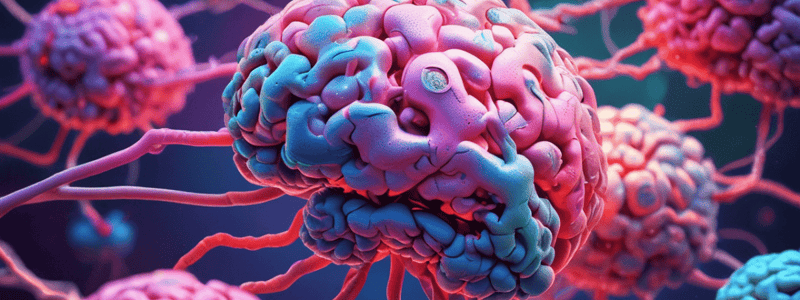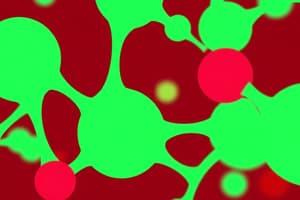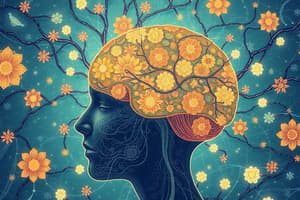Podcast
Questions and Answers
What is the main focus of advance directives?
What is the main focus of advance directives?
- Decreasing the number of synapses
- Decisions about life-sustaining treatments (correct)
- Maintaining white matter health
- Ensuring compliance with state laws
Which age-related change occurs in diseases like Alzheimer's?
Which age-related change occurs in diseases like Alzheimer's?
- Number of synapses decreases (correct)
- Number of synapses increases
- Number of neurons increases
- Dendrites size remains constant
What do white matter hyperintensities (WMH) indicate?
What do white matter hyperintensities (WMH) indicate?
- Enhanced density of synapses
- Development of tangles in axon fibers
- Myelin loss or neural atrophy (correct)
- Increase in dopamine levels
Which neurotransmitter is associated with higher-level cognitive functioning?
Which neurotransmitter is associated with higher-level cognitive functioning?
What is the main purpose of the Patient Self-Determination Act (PSDA)?
What is the main purpose of the Patient Self-Determination Act (PSDA)?
What neurotransmitter has been shown to be related to cognitive decline?
What neurotransmitter has been shown to be related to cognitive decline?
Which brain structure is associated with memory declines due to damage in structures that use acetylcholine?
Which brain structure is associated with memory declines due to damage in structures that use acetylcholine?
Which area of the brain experiences considerable shrinkage particularly in the aging process?
Which area of the brain experiences considerable shrinkage particularly in the aging process?
Which theory proposes that intelligence comes from a distributed network of neurons in the parietal and frontal areas of the brain?
Which theory proposes that intelligence comes from a distributed network of neurons in the parietal and frontal areas of the brain?
Which theory suggests that aging brains overutilize regions in the left hemisphere for demanding tasks?
Which theory suggests that aging brains overutilize regions in the left hemisphere for demanding tasks?
According to the Information-Processing Model, what does 'active processing' refer to?
According to the Information-Processing Model, what does 'active processing' refer to?
What is the first level of processing incoming information from the environment according to the Information-Processing Model?
What is the first level of processing incoming information from the environment according to the Information-Processing Model?
Which model of cognition is based on a computer metaphor?
Which model of cognition is based on a computer metaphor?
In the context of adult development and aging, what are the three fundamental questions related to the Information-Processing Model?
In the context of adult development and aging, what are the three fundamental questions related to the Information-Processing Model?
What kind of information does the Information-Processing Model emphasize examining?
What kind of information does the Information-Processing Model emphasize examining?
What is the function of dendrites in neurons?
What is the function of dendrites in neurons?
Which structural changes are associated with Alzheimer's disease?
Which structural changes are associated with Alzheimer's disease?
What neurotransmitter decreases as people age and is linked to Parkinson's disease?
What neurotransmitter decreases as people age and is linked to Parkinson's disease?
What is a characteristic of autonomic nervous system function in older adults?
What is a characteristic of autonomic nervous system function in older adults?
Which of the following is NOT a major cause of sleep disturbances in older adults according to the text?
Which of the following is NOT a major cause of sleep disturbances in older adults according to the text?
Flashcards are hidden until you start studying
Study Notes
Cognitive Aging
- Changes in dopamine levels may play a major role in cognitive aging, affecting effortful and automatic processes
- Abnormal processing of serotonin is related to cognitive decline
- Damage to structures that use acetylcholine is associated with memory decline
- The Positivity Effect: Older adults are more motivated to derive emotional meaning from life and maintain positive feelings than younger adults
- Theory of Mind (ToM): The ability to understand that others have beliefs, desires, and viewpoints different from our own; research shows age-related decline in ToM (over 75)
Executive Functioning
- Difficulty focusing solely on relevant information due to WMH and reduced volume of prefrontal cortex
- Memory decline due to specific structural changes (e.g., the hippocampus)
- Better emotional regulation with age
- Increased processing of positive emotional information with age
Social-Emotional Cognition
- Older adults may rely more on automatic judgment processes than reflective processing
Theories and Models of Brain-Behavior Changes Across Adulthood
The Parieto-Frontal Integration Theory (P-FIT)
- Proposes that intelligence comes from a distributed and integrated network of neurons in the parietal and frontal areas of the brain
CRUNCH (Compensation-Related Utilization of Neural Circuits Hypothesis)
- Additional mechanisms at work in aging brains, overutilizing other regions in the left hemisphere on demanding tasks
STAC-r (Scaffolding Theory of Cognitive Age—Revised)
- Default network theory holds that when cognitive demands are made on the brain, the default network is suppressed
- Neural resource enrichment and depletion interact with neural plasticity to account for age-related changes in cognitive functioning
Information-Processing Model
- Based on a computer metaphor
- Three assumptions:
- Active processing: the individual is actively involved in transforming incoming information
- Both quantitative and qualitative aspects of performance can be examined
- Information is processed through a stage-like series of "stores"
Respiratory System
- Changes in the respiratory system include shortness of breath, which may result in a reduction of activity in older adults
- Chronic obstructive pulmonary disease (COPD) is a family of diseases that includes emphysema and chronic bronchitis
Biological Changes
Female Reproductive System
- Menopause and climacteric: the transition from being able to have children to the cessation of ovulation (usually begins in the 40's and complete by mid-50's)
Male Reproductive System
- Sperm production declines gradually with age
- Testosterone levels decline gradually with age
- Prostate gland enlargement with increasing age
Central Nervous System
- Neurons: individual brain cells, with changes occurring at the level of individual brain cells
- Dendrites: where neurons receive chemical information from other neurons
- Synapses: chemicals are sent out into the gap between neurons to be picked up by a neighboring neuron's dendrites
Structural Changes in Neurons
- Aspects of growth and loss of dendrites during the life span
- Neurofibrillary tangles: when fibers of the axon become twisted to form spiral filaments
- Neuritic plaques: occur when dying neurons collect around a core of protein
Changes in Neurotransmitters
- Acetylcholine: decreases with age, research has speculated that abnormally low levels are related to Alzheimer's disease
- Dopamine: decreases with age, an extreme decline in the dopamine system is related to Parkinson's disease
Autonomic Nervous System
- Regulating body temperature: older adults have a harder time dealing with heat and cold, putting them at risk for hypothermia and hyperthermia
- Sleep and aging: older adults have more difficulty falling asleep and staying asleep, with changes in circadian rhythms
Genetic and Environmental Factors in Average Longevity
- Genetic factors: being born into families who have lived long is a strong predictor of longevity
- Environmental factors: disease, toxins, health behaviors/lifestyle, and socioeconomic status can shorten lives
Studying That Suits You
Use AI to generate personalized quizzes and flashcards to suit your learning preferences.




